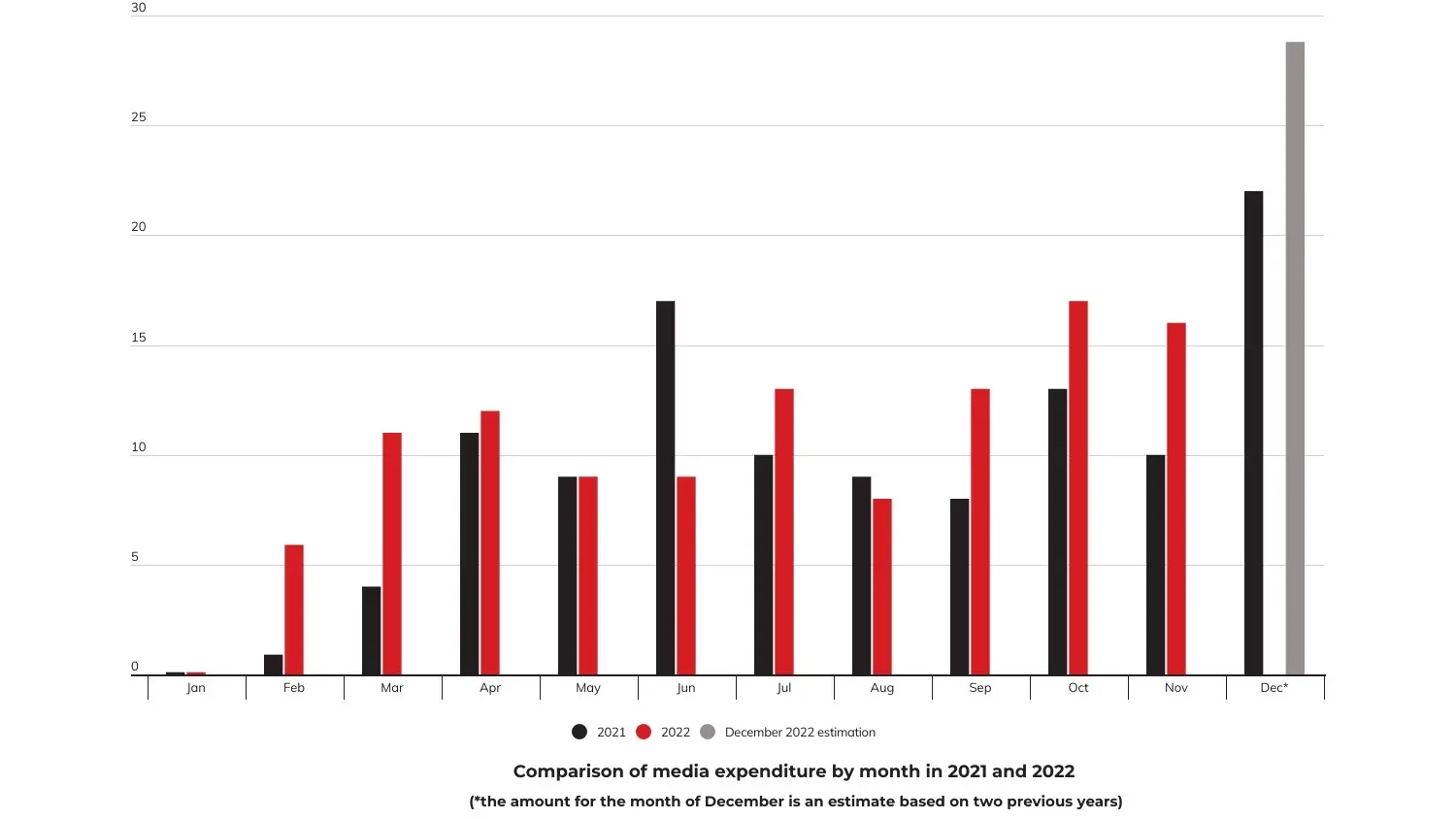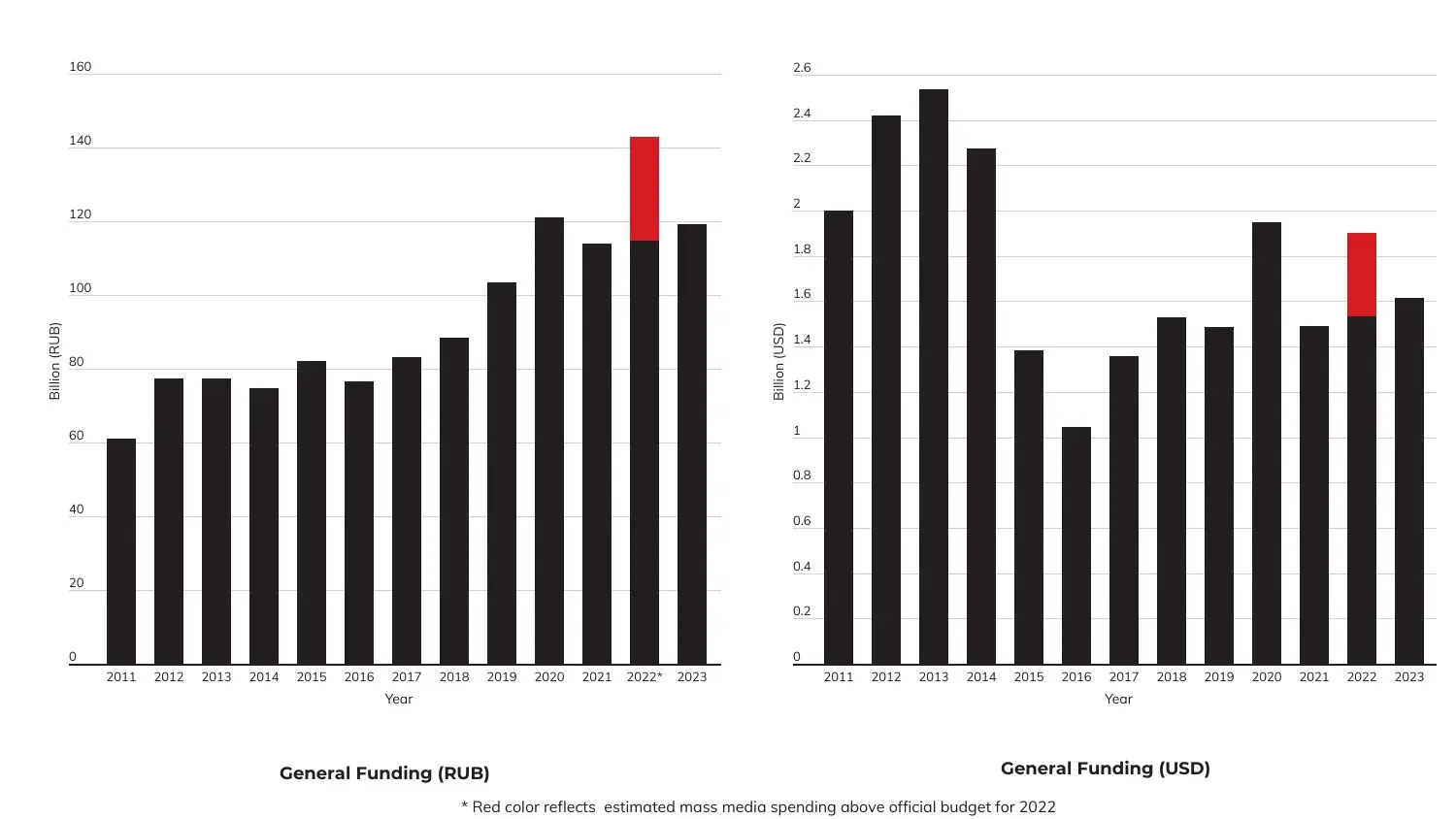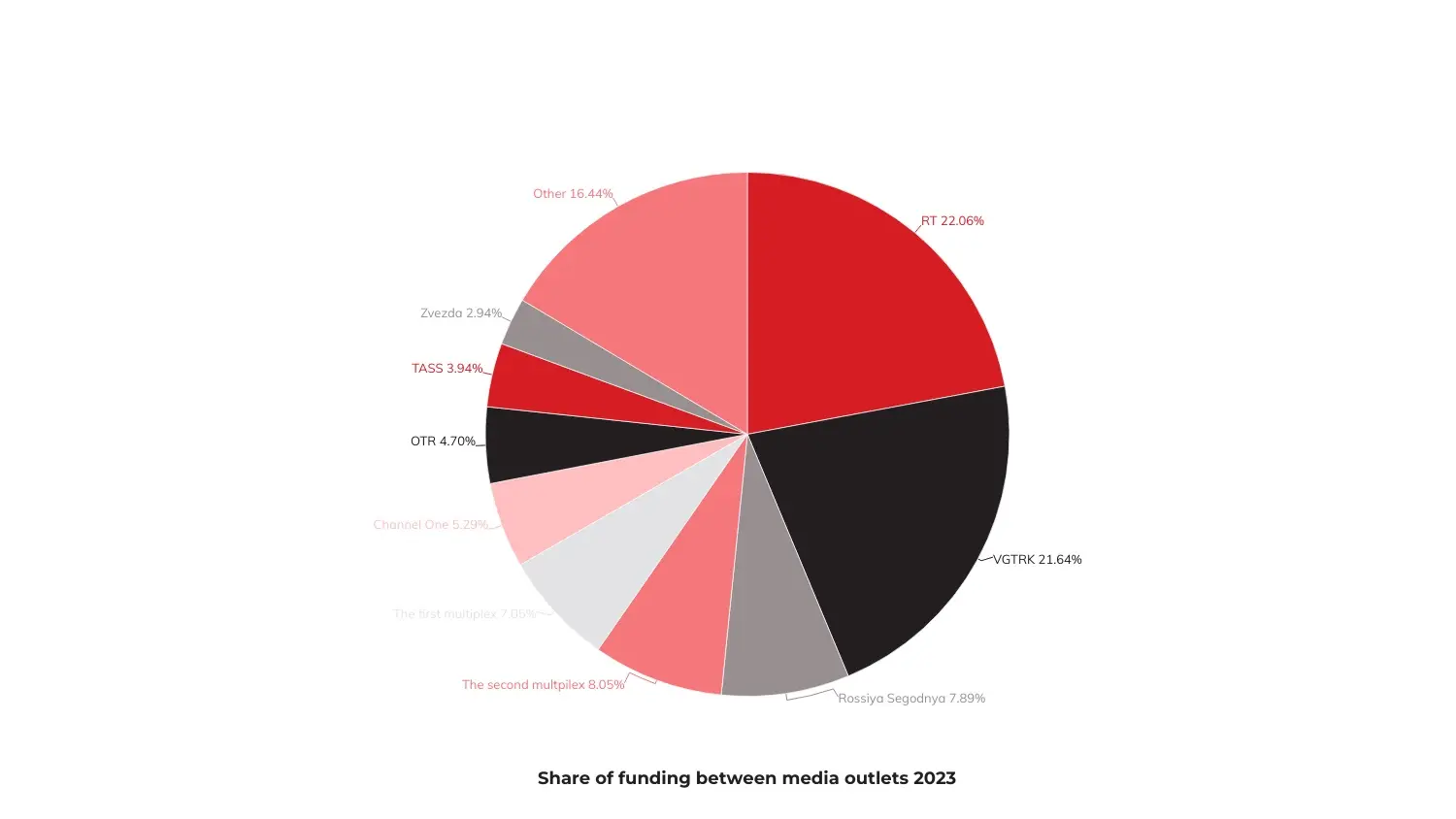 source: Debunk.org
source: Debunk.orgIn 2023, as in previous years, over half of the allocated mass media budget was directed to three key propaganda agencies.
- 51% of the funds went to the All-Russia State Television and Radio Broadcasting Company (VGTRK), RT (formerly Russia Today), and Rossiya Segodnya, notes co-author of the analysis, Aleksandra Michałowska-Kubś.
 source: Debunk.org
source: Debunk.orgVGTRK, a media holding targeting primarily Russian audiences, is set to receive 25.8 billion RUB this year. It operates a network of federal and regional television channels, with programs also available online. However, television popularity in Russia has recently declined - between February and July 2022, the audience for Channel One, Russia-1, and NTV dropped by a quarter. Furthermore, since the war in Ukraine began, VGTRK lost several key foreign sponsors as companies advertising on its channels exited the Russian market. The agency has also been impacted by Western sanctions.
- It seems, however, that 25.8 billion RUB is sufficient to broadcast propaganda domestically and expand media operations in the occupied territories of Ukraine. It was announced that VGTRK is opening branches in the Luhansk, Donetsk, Kherson, and Zaporizhzhia regions, notes Michałowska-Kubś.
Meanwhile, RT, the main pillar of the Kremlin’s international information influence, has seen a slight funding decrease. In 2023, it was allocated 26.3 billion RUB. Sanctions imposed on Russia after the invasion of Ukraine have led the agency to cease broadcasting in the EU, Canada, the US, and the UK and to close selected offices. However, RT has found ways to expand its operations, including entering the Serbian market. RT Balkan plans to start broadcasting no later than 2024. The agency is also strengthening its presence in Asia, Africa, and South America.
Interestingly, another entity funded by the budget has received significant generosity from Russian authorities. In 2023, Zvezda, a media network run by the Russian Ministry of Defense, nearly doubled its funding to 3.5 billion RUB.
 source: Debunk.org
source: Debunk.org- This year`s analysis confirms that propaganda is a key pillar of the regime and one of the Kremlin`s main tools of power. Legal changes threatening up to 15 years in prison for spreading "false information" about the so-called "special military operation" and the elimination of remaining independent media further emphasize that Russian authorities treat information as a weapon - not only against their own citizens. It’s important to remember that for Russia, the information space has always been a battleground, conclude analysts from the think tank Debunk.org.
Debunk.org is an independent tech-focused think tank and NGO specializing in analyzing disinformation and running educational media campaigns across eight countries. It has been countering disinformation since 2017. Link to the full article: https://www.debunk.org/pl/w-zeszłym-roku-propaganda-kosztowała-kreml-1-9-mld-usd-budżet-na-media-został-przekroczony-o-25
SWAMPED and ZASŁONA: Russian Disinformation Techniques
The EU’s East StratCom Task Force, dedicated to identifying disinformation originating outside the EU, published a list on the EUvsDisinfo portal outlining the methods the Kremlin and its agencies use to spread disinformation globally, including in Poland.
The set of disinformation and propaganda techniques is summarized under the acronym SWAMPED:
- S for Straw Man:
Attributing statements or opinions to a person or institution that were never expressed, then mocking, undermining, or attacking those views. - W for Whataboutism:
Creating the illusion of hypocrisy on the opposing side by deflecting accusations with arguments that "you/they did or do something similar." - A for Attack:
Spreading information, often false, aimed at discrediting or compromising the opponent. - M for Mockery:
Ridiculing or mocking the other side, often using out-of-context, exaggerated, or manipulated information. - P for Provocations:
Undermining opinions and beliefs using false but widely distributed claims to sow doubt and distrust. - E for Exhaust:
Distracting from the core issue by overwhelming the opponent with both authentic and fabricated data, statistics, and comparisons. - D for Denial:
A defensive method involving denial of evidence, disclaiming responsibility, and suggesting accusations stem from bias or prejudice.
COMMERCIAL BREAK
New articles in section Media industry
How artificial intelligence misrepresents the news. PBC analysis
Sylwia Markowska
In news summaries generated by the most popular models in Polish, as many as 46% of responses contained at least one significant error, 27% had serious issues with sources (missing, misleading, or incorrect), and 19% contained hallucinations and outdated information.
Children and communication with machines. Experiment by SWPS researchers
SWPS
How do primary school students treat humanoid robots? Researchers from SWPS University have shown that in most cases, children relate to robots politely, and younger children and girls more often perceive them as possessing human characteristics.
Streaming platforms in Poland. What criteria determine the choice
Paweł Sobczak
Price, indicated by 54.2% of respondents, and subject matter (54% of indications) are the most important factors influencing users' choice of content on streaming services. The service brand is mentioned by 18.1% of those surveyed.
See articles on a similar topic:
Greenwashing storms media in Poland. Business feel the impact too
BDw
A surge in media coverage reveals a new reality: ESG isn't just a corporate responsibility buzzword anymore - it's a battlefield. According to the Institute of Media Monitoring (IMM), Polish media mentioned "greenwashing" in 619 publications and "eco-hypocrisy" in another 545 in Q1 2025.
YouTube redefines viewer engagement. Goodbye to returning viewers
KFi
As many as 30% of internet users now turn to YouTube as their main news source, and 65% consume news in video form. Now the platform is shaking things up. Reach still matters, but engagement is what really counts.
First Trillion Dollars. Advertising Market 2024 and Forecasts for 2025
DUG
GroupM, in its cyclical report "This Year Next Year," summarizing the past year and predicting trends for the next, has published the latest forecasts for global advertising markets. The estimated advertising market growth rate in 2024 is as high as 9.5%, bringing its value globally to over 1 trillion dollars.
How Journalists Use Social Media
Bartłomiej Dwornik
Primarily, they seek inspiration from blogs and, less frequently, from Facebook. They rarely trust what they find, often approaching it with caution. Credibility does not necessarily correlate with attractiveness.





























